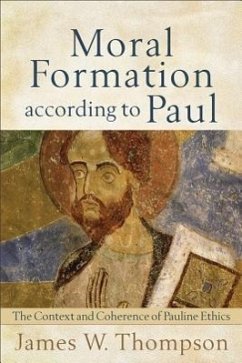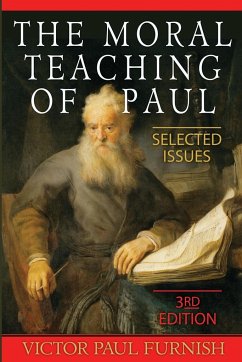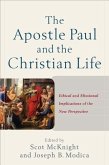"This important study locates moral formation squarely at the heart of Paul's letters--not by replacing 'theology' with 'ethics' but by demonstrating that Paul's agenda was in fact the moral transformation of his communities. Thompson traces the roots of Paul's moral teaching in the Old Testament and the story of Christ and exposes his indebtedness more to Hellenistic Judaism than to Greco-Roman moral philosophy. Crucially, he positions Paul's writings in another 'context, ' in communities of people who have begun new life in Christ, who await the final day, and for whom the present is about metamorphosis into a moral counterculture. Thompson does not try to answer all of our present-day questions; instead, he marks well the path for anyone wanting to explore the contours and coherence of Paul's moral vision." --Joel B. Green, editor of Dictionary of Scripture and Ethics; professor of New Testament interpretation, Fuller Theological Seminary "In his bracing book, Thompson argues that a coherence to Paul's ethical instruction is found in Paul's stress on the corporate nature of Christian morality. He holds that the church, a countercultural community, is demarcated by its adherence to commandments of the Law viewed through the lens of the Love Commandment. Thompson thinks that the topics of Paul's moral instruction, from the earliest catechesis of converts onward, are those of Jewish moral teaching based on the Torah. He is thoroughly conversant with scholarship on Pauline ethics, but his focus is on a close reading of Pauline texts. The book will be useful to pastors and students and provocative to fellow scholars." --Abraham J. Malherbe, Buckingham Professor Emeritus of New Testament Criticism and Interpretation, Yale University "Books on the moral life according to Paul are relatively scarce. We can be grateful to Thompson for his lucid and readable survey of moral transformation in Paul. Comparing and contrasting Paul's moral vision with both Greco-Roman and Hellenistic writers provides an illuminating social context in which to interpret Paul." --Thomas R. Schreiner, James Buchanan Harrison Professor of New Testament Interpretation, The Southern Baptist Theological Seminary
Bitte wählen Sie Ihr Anliegen aus.
Rechnungen
Retourenschein anfordern
Bestellstatus
Storno








